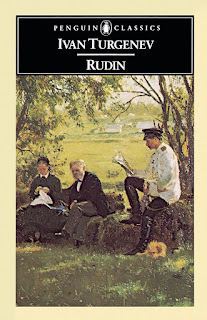Rudin - Ivan Turgenev
In Rudin, it is Darya Mihailovna's daughter 17 year old Natalya who becomes the centre of the romantic entanglements that ensue when a new guest comes into the household, Dimitri Nikolaitch Rudin. Natalya is dazzled by the eloquence and wisdom of the man, who eclipses the empty pose, cynicism and 'bon mots' of the others, and Rudin comes to replace the rather dull and inarticulate Volintsev in her affections. Some of the men who have known Rudin in the past have doubts however about Rudin's strength of character and the conviction of his romantic intentions towards Natalya.
The majority of the novel then may seem rather lightweight, structured around a brief scarcely existent romance, featuring lots of ineffectual talking, discussion and gossip between society gentlemen on subjects of art, poetry, music, and romantic ideals - but the setting, the talk and the behaviour of the characters tells us rather more about the individuals than might be expected. Certainly, it's all very entertaining, and some wisdom is indeed dispensed amid much empty theorising and philosophising, but there appears to be no sincerity or willingness on the part of anyone to do anything but talk about it all.
Affairs of the heart are however Turgenev's specialty, and it is through their conduct with women that the author best manages to examine the essential character of Russian men. Not untypically - at least until he came to write his masterpiece Fathers and Sons - he finds something wanting in his leading men. In comparison to Volintsev, Lezhnyov, Pandalevsky and Pigasov, Rudin would appear to be an intellectual as well as a man of ideals and practicalities, but he proves - through his behaviour with Natalya - to be a man without conviction, sincerity, substance and more importantly a man without passion. This isn't necessarily the fault of the young man, since like the others in this period before social reform, there is no outlet yet for his fine ideas.
All the same, while the subject is perfectly in keeping with Turgenev's usual themes, the ideas as they are expressed by the author in this slim novel are fairly lightweight and thin. Although there is some attempt here at using nature through meetings in gardens and allusions to branches on a oak tree as an expression of the inner lives of the characters, Turgenev would much more successfully bind his characters - of a greater variety of social classes moreover - with the very earth of Russia in his subsequent novel, Nest of the Gentry, and approach the reality of the underlying complexities of the dilemma faced by the individual in a progressive, modern world of social reform with a great deal more precision in Fathers and Sons.




Comments
Post a Comment